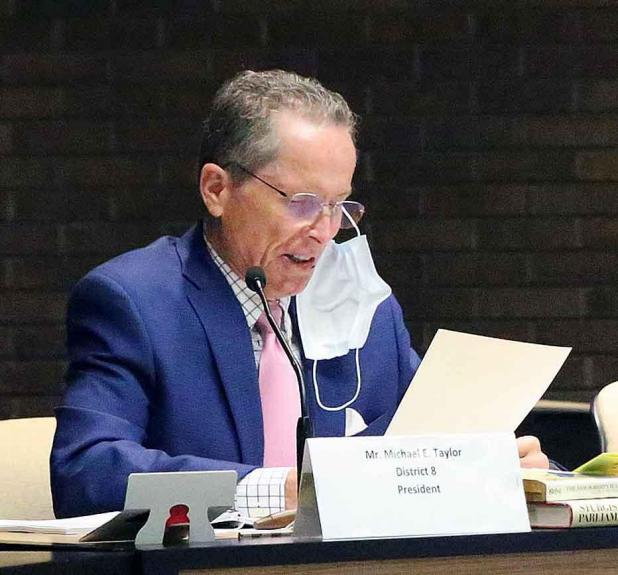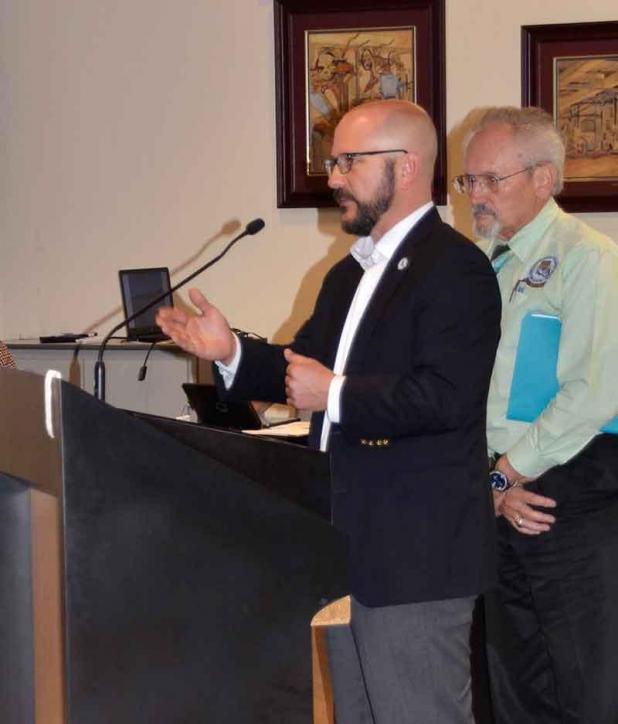
School Board member Michael Taylor

Parish President David Hanagriff
From the Editor: Tough choice for voters on school tax
With impeachment votes, CPAC speeches and arguments over who pays for St. Mary Parish firefighting, it may seem as though the dust hasn’t settled yet from the November and December elections. But it’s already time to go back to the polls.
Early voting opens Saturday for the March 20 election, which in St. Mary Parish means it’s time to decide whether we’ll pay another 0.45% in sales taxes to give teachers and other School Board employees a raise.
The School Board, members of which represent a variety of political views, has been united and persistent in putting the tax to the voters. Key public officials have been equally persistent in their opposition.
Now it’s up to the voters, and the choice is a tough one. Tough choices mean that even if your side wins, there’s a cost.
The 0.45% tax would, according to the ballot language, raise about $3.85 million a year “to be dedicated and used to supplement salaries and benefits paid by the School Board for teachers and other personnel employed by the School Board.”
The School Board’s plan is to give certified employees a $3,000 annual raise and other employees a $1,500 raise.
The stakes are high because of the school system’s importance here. Any list of St. Mary’s top assets would have to include the public schools.
The state’s performance scores put St. Mary in the top quarter of Louisiana parishes, even though six of every 10 public school students here come from low-income homes. To stay at that level, according to proponents, the School Board must offer competitive pay to attract and keep talented employees.
At a recent meeting, Superintendent Teresa Bagwell said St. Mary will still have low sales taxes compared to other parishes in the region.
She cited Louisiana Department of Education statistics saying that in 2018-19, St. Mary’s average annual teacher salary of $47,933 is more than $2,000 less than the state average.
And nearly half of teachers are leaving the profession during their first five years, Bagwell said.
In November, then-School Board President Michael Taylor said St. Mary ranks 42nd among parishes in teacher pay.
“This is a vast difference in the effectiveness of teachers to impact student achievement and the rate at which they are compensated,” Taylor said.
So why not vote for the tax?
The opposition case comes down to one thing: the economy. The argument is that local commerce doesn’t need the hit that a new tax would inflict.
We all know how St. Mary has struggled since oil prices began their long slide from $105 a barrel in late summer 2014. Aside from occasional peaks, the price has generally stayed below $60 and is often below $50.
Then came COVID-19 and the economic restrictions that pushed St. Mary’s unemployment rate to a depression-level 14.8% in May. Unemployment here was nearly 8% as late as December.
The result has been the loss of about a third of St. Mary’s jobs in 6½ years, according to the U.S. Bureau of Labor Statistics.
Parish President David Hanagriff has so far kept his promise to speak out against the proposed tax at every St. Mary Parish Council meeting. Hanagriff argues that the timing is all wrong for a new tax.
And, he said at last week’s meeting, the School Board should do more to trim costs, especially at the central office, before asking voters for a new tax.
Former Morgan City Mayor Frank “Boo” Grizzaffi, who left office in January, was another early opponent of the proposal. He noted that sales in Morgan City are already taxed at 8.75%, so the 0.45% addition would push the total rate over 9%.
The most influential opponent has been state Sen. Bret Allain, R-Franklin. Allain told The Daily Review earlier this year that the early word about Census results is that St. Mary may have lost 10% of its population in the last decade of economic struggle, making a new tax a bad idea.
Allain also had objected to an earlier version of the tax proposal developed by the School Board for submission to voters last spring. That proposal was for a 0.5% tax for salaries as well as for a technology fund.
The senator didn’t like the technology fund provision and said that if it was included, he’d insist that the sales tax vote be on the same day as the presidential election so that more voters would have a say. And, as a member of the State Bond Commission that must OK tax proposals for the ballot, Allain was in a position to do something about it.
The School Board eventually lowered the proposed tax to 0.45% and took out the technology fund measure. Even so, COVID delayed the election, and the board eventually withdrew the tax proposal over concern about ballot language developed by the Secretary of State’s Office.
The board came back with the latest proposal, the 0.45% tax with no technology fund, and voted in November to put it before voters. So the tax will appear on the spring ballot, when turnout will presumably be lower and the support of School Board employees will loom larger.
In any case, St. Mary voters have a choice to make March 20.
Bill Decker is managing editor of The Daily Review.
